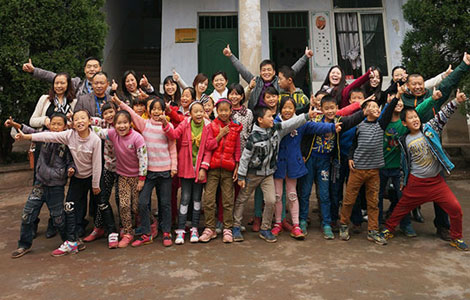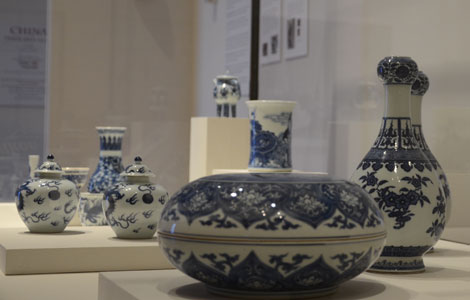Sales stall for winner
Updated: 2015-01-21 07:10
By Xing Yi(China Daily)
|
||||||||
Bookstores across China returned thousands of copies of writer Mo Yan's novels to his publishers at the end of last year. Is literature facing a crisis? Xing Yi finds out.
Mo Yan's novels are not doing well.
According to Wen Hui Daily, a Shanghai-based newspaper with a tradition of reporting on culture, bookstores around China returned copies of the Nobel laureate's books - valued at 9.5 million yuan ($1.53 million) based on their prices - to his publishers at the end of 2014. They account for 10 percent of the total printed copies of his books.
The price of a Mo Yan book ranges from 30 to 40 yuan at local bookstores.
The sales figures of Mo Yan's books at Xinhua bookstore in Beijing's Wangfujing area partially supported the report. Ge Fei, the deputy general manager of the major bookstore, told China Daily that the sales of Mo's novels have been going down.
"We sold more than 18,000 copies in the last quarter of 2012 after Mo won the Nobel Prize in literature in October. The following year, we sold around 7,000 copies of his books. But we sold only 3,000 copies last year."
Online sales numbers reflect the same trend. The 60-year-old Mo's most recent novel, Frog, about the country's one-child policy, which occupied the second spot on the best-seller list on China's major online bookstore Dangdang.com in 2012, slipped to 42nd place in 2014.
Although the sales of Mo's books have slowed down, most insiders in China's publishing industry say the volume of the returned books is still below the average returned rate for literature and art books, which stands at around 15 to 20 percent in general.
Some in the industry, however, interpret the slowing down of the sales of Mo's works as a sign of the marginalization of literature.
Jia Zongpei, editor-in-chief of Shanghai Literature and Art Publishing House, thinks that in the era of the Internet, people have been drawn to many other diversions, and literary works no longer command the attention they did.
"We had published some best-selling literature works, such as Brothers by Yu Hua, but that was before the prevalence of social media," adds Jia.
However, more see the cooling of the "Mo Yan craze" as normal.
"Mo Yan's novels are not commercially popular works," says Hai Yan, a celebrated screenwriter. "It's just like how well-cooked dishes in restaurants cannot compete in amount with the sales of fast food."
Although Mo was considered to be among the first-tier writers of China even before he won the Nobel Prize, not all of his novels had attracted public interest.
Mo's most popular work remains Red Sorghum Clan, which acclaimed director Zhang Yimou adapted into a movie in 1987. It became the first Chinese film to win the Golden Bear Award in the Berlin International Film Festival in 1988.
Thanks to the Nobel Prize, the sales of Mo's works skyrocketed in 2012. "Mo became a cultural symbol as the world recognized Chinese literature," says Wang Hongtu, professor of Chinese literature at Fudan University.
"The prize will certainly draw people's attention to an author for a period of time. But it won't change people's taste in literature," adds Wang. "To appreciate Mo's works requires a sophisticated sense of aesthetic, and there are not many such sophisticated readers out there."
In recent years, although the publishing industry has seen an annual rise in total volume, the sales of serious literary works remain unpromising.
"Genre fiction is what will sell," says Li Ping, an expert on book marketing.
"For example, Mai Jia's espionage novels and Guo Jingming's youth stories have a loyal following. The more they write in their genres, the more they will keep their readers and acquire new ones," Li says.
Earlier this month, Mo revealed to a government website that he is preparing to write about the ills of corruption and the ongoing anti-graft efforts.
Contact the writer at xingyi@chinadaily.com.cn
(China Daily 01/21/2015 page22)
- Chinese premier arrives in Switzerland for Davos forum, working visit
- Obama to focus on middle class in State of Union address
- Chinese naval escort fleet visits Germany
- At least 4 killed in clashes in Congo
- UN condemns escalating attacks by Boko Haram
- Israel steps up security for possible Syria airstrike

 Chinese premier arrives in Switzerland for Davos forum, working visit
Chinese premier arrives in Switzerland for Davos forum, working visit
 7 things you may not know about Major Cold
7 things you may not know about Major Cold
 After the American dream breaks
After the American dream breaks
 300 libraries for China's countryside
300 libraries for China's countryside
 New York Philharmonic to celebrate Lunar New Year
New York Philharmonic to celebrate Lunar New Year
 Long Island collectors display Chinese art then and now
Long Island collectors display Chinese art then and now
 China's Li Na expecting first baby
China's Li Na expecting first baby
 Bank, Rockets help out school
Bank, Rockets help out school
Most Viewed
Editor's Picks

|

|

|

|

|

|
Today's Top News
Foreign oil wells attract Chinese investors
Chinese premier arrives in Switzerland for Davos forum, working visit
Obama to focus on middle class in State of Union address
Drive against terrorism in Xinjiang shows result
Xiaomi feeling 'phabulous' about new phablet
Economic growth edges to 24-year low of 7.4%
Opening round of Iran sanctions fight kicks off in Senate
China: Pet-food products removal not a judgment
US Weekly

|

|








